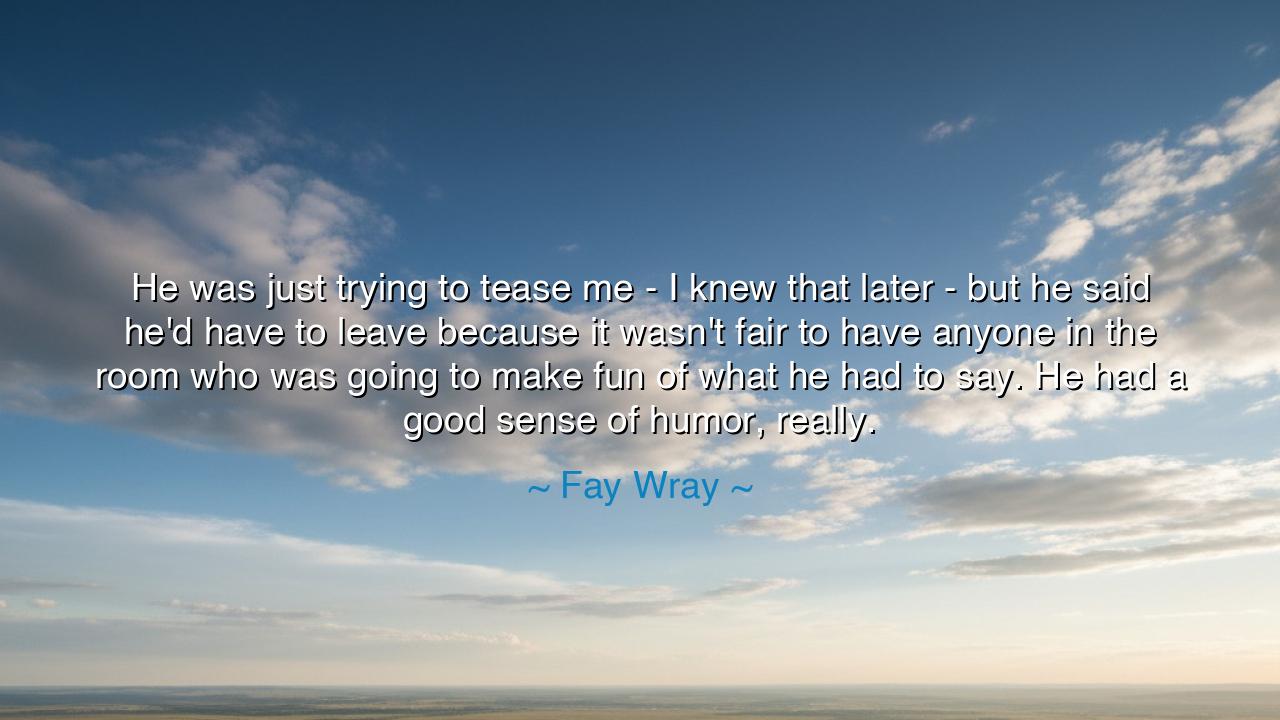
He was just trying to tease me - I knew that later - but he said
He was just trying to tease me - I knew that later - but he said he'd have to leave because it wasn't fair to have anyone in the room who was going to make fun of what he had to say. He had a good sense of humor, really.






In the great theater of life, where words and actions intertwine, there are moments of both playfulness and misunderstanding. Fay Wray shares with us such a moment in her words: "He was just trying to tease me - I knew that later - but he said he'd have to leave because it wasn't fair to have anyone in the room who was going to make fun of what he had to say. He had a good sense of humor, really." These words speak to the delicate balance between humor, intention, and interpretation. In this instance, what began as a playful jest could have been misunderstood, but in the end, it reveals the power of laughter and the importance of understanding the spirit behind the words we exchange.
Consider, children, the ancient Greeks, who held humor in high regard, not just as a source of entertainment, but as a reflection of the soul. The great Aristophanes was a master of satire—his plays often made fun of the political and social structures of his day, using humor as a tool to provoke thought and encourage change. But Aristophanes understood that humor, while powerful, must always be wielded with care. Like the man in Wray's story, who recognized the line between teasing and mocking, Aristophanes' wit was sharp, yet always underpinned by a deeper respect for the human condition. It was humor with a purpose, never mean-spirited but rather aimed at reflection and growth.
In Rome, the philosopher Cicero often employed humor in his speeches, but it was humor rooted in truth, not in cruelty. He understood that laughter could serve as a means to convey wisdom, yet it could also be a means of defense. In the Roman world, to make fun of someone publicly was not always an act of goodwill—it was a potential challenge to their honor. Cicero balanced this well, knowing that humor, when used improperly, could undermine the dignity of a person. Like the man in Wray's story, Cicero recognized that humor should never be used to diminish another, but rather to elevate the conversation and allow for deeper understanding.
Look, too, at the great warriors of the past, such as Alexander the Great, whose campaigns were as much about strategy and intellect as they were about might. Alexander's humor was said to be a key part of his charm, a way to endear himself to his soldiers and those around him. But he was also known to be deeply serious when it came to matters of honor. Humor, in his case, served to bond his men, to break the tension of battle, yet it was always tempered by the understanding that respect must underlie all interactions. Alexander's leadership was built not just on strength, but on the understanding of how to use humor to unite and not divide. His ability to balance teasing with respect was one of the reasons his soldiers followed him loyally.
And so, my children, the lesson is clear: humor, when used properly, is a bridge between hearts, a tool for connection and understanding. Yet it is a bridge that must be built with care, for the same words that lift the spirit can also wound. In the story shared by Wray, we see the interplay between teasing and sensitivity—the recognition that humor, while playful, must also be underpinned by an awareness of the feelings and dignity of others. Just as Wray learned that the man’s intent was playful, so must we learn to interpret humor through the lens of intent, not just words. A good sense of humor is one that does not seek to belittle, but to uplift. It is one that understands when to tease and when to show respect.
The lesson for us, children, is to approach humor with both wisdom and compassion. We must learn to use it to connect, to lighten the burdens of others, and to bring joy into the world. But we must also be aware of its power to hurt, to misinterpret, and to create divisions. In every jest, ask yourself: is this humor that builds, or is it humor that divides? Is it humor that shows respect, or humor that seeks to diminish? Let us choose wisely, so that our humor can be a force for good—a way to unite, to heal, and to understand one another more deeply.
So, children, when you laugh, let it be a laughter that reflects the heart—a laughter that recognizes the humanity of those around you, that acknowledges the fragility of life, and that brings us closer together rather than tearing us apart. Teasing, when done with love and care, can be a gift—a shared bond. But never forget the importance of respect. Use humor not to tear others down, but to lift them up, and in this, you will walk the path of wisdom and grace.






AAdministratorAdministrator
Welcome, honored guests. Please leave a comment, we will respond soon